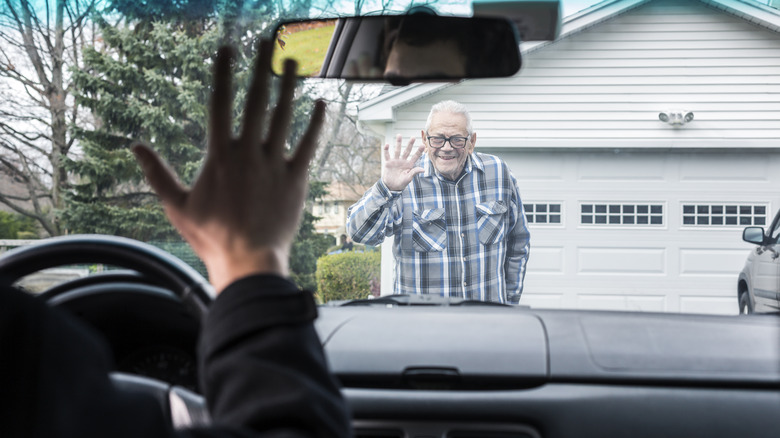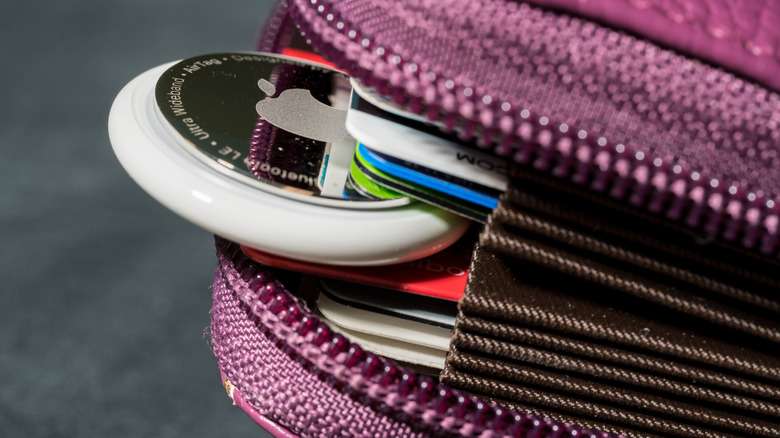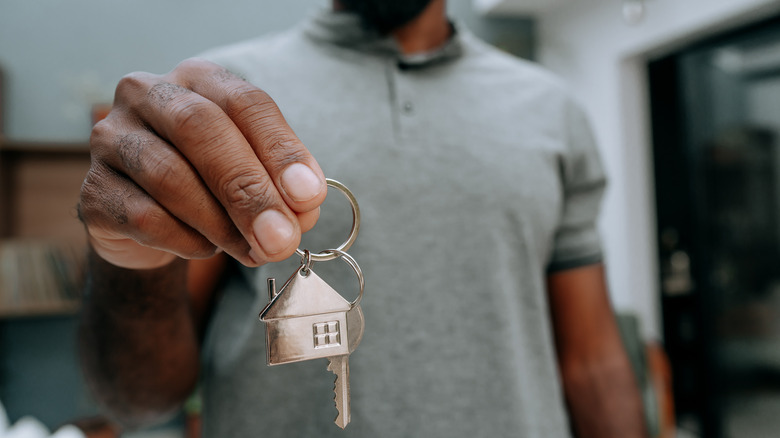The Best Ways To Disappear Without A Trace
There are a lot of reasons someone might want to appear to disappear off the face of the earth, and let's get one thing straight from the get-go: This isn't the, "I've made the mob angry and now they want to kill me, so now I have to build a whole new identity," sort of disappear. (That sort of advice is illegal, and not a road this article will go down.)
This is the sort of disappearing that's much more common and arguably much more heartbreaking; it's the sort that happens when someone wants to escape an abusive partner, or vanish far beyond the clutches of toxic parents. This is getting away from the uncle who was never allowed to be alone with the kids, this is getting away from the family that's a danger to your children. It's these situations that might put a person in a place where they just want to get away, start over, and not have to worry about an ominous knock on the door.
There are moments when everyone's tempted to think that it might be a great idea, but it's not easy and not something to be undertaken lightly. Gerald Shur knows — he created the Witness Protection Program. He told CNN that anyone who decides to disappear has to come to terms with the fact that it means cutting out everyone — friends, family, acquaintances. And that's not the only incredibly difficult obstacle on the path to anonymity and a new life.
Be prepared to cut all ties with friends and family
One of the best sources of what to do and what not to do if you're trying to disappear well beyond the reach of your old life is someone who conducts missing persons investigations. When Grunge reached out to Darrin Giglio, chief investigator of North American Investigations, he told us that there are no obvious factors that determine whether or not a person's going to be successful at disappearing. "Staying off the grid and living a normal life takes a lot of planning, knowledge, and commitment, which can be very difficult for most people," he explained.
First and foremost, what actually determines a likelihood of success is the ability to make a commitment: adhering to a lifetime of alienation from anyone and everyone you'd known from the life you're fleeing. Giglio says that one of the biggest mistakes people make is remaining in or resuming contact with friends and family. Those people, he adds, are the first place someone's going to look — and it includes more people than one might expect.
"A very successful tactic to track people are through their family, friends, significant other, work associates, and contacts," he said. "These are all potential leads to track an individual. It is very difficult to cut off anyone important in your life." That's even the case when lives are on the line: Giglio added that when people leave witness protection, it's usually because they miss their family.
You might want to tell someone you're leaving, and why
This one definitely depends on the circumstances of why someone might want to disappear, and it's a bit of seemingly counterintuitive advice that's actually pretty brilliant. Jason Hanson is a former CIA agent, author of "Spy Secrets That Can Save Your Life," and now advises people from all walks of life in matters of security, privacy, and self-defense. He gives the example of a person who wants to escape a marriage that they feel like they're trapped in, and in that case, Hanson says that one of the things you're going to want to do is, well, tell someone exactly what you're doing.
Why on earth would you do that? He explains that by sending a letter or email to that soon-to-be-single significant other, by handing in your resignation at work, and by letting close friends or family members know what's going on, they're not going to report you missing — or, if you are reported missing, someone will be able to tell law enforcement what they need to know in order to get them to call off the search.
And it makes sense. If law enforcement thinks you may have been kidnapped, they're going to start looking — which is exactly what you don't want if you're trying to disappear. Letting someone know that you're doing it of your own free will, and that it's a clearly premeditated disappearance, will go a long way in getting away without leaving telltale footprints.
Here's how to research where you're going to go
So, let's talk about where you're going to go, keeping in mind some advice that Grunge got from Darrin Giglio, chief investigator of North American Investigations. While a cabin in the remote wilderness might be tempting, he says, "Unless you are a 'Mountain Man or Woman' with a lot of training and can be totally self-sufficient in the 'woods,' you will find that it is not an easy task to remain anonymous." That said, how do you figure out where you'll settle?
A successful disappearance starts with this task, long before you actually ride off into the sunset. Frank Ahearn is the author of "How to Disappear," and he makes a living helping people erase their digital footprint. It's harder than it sounds but not impossible, and he told Wired that anyone using the internet to search for a new home needs to follow a few guidelines. For starters, don't do any real searching from home computers or other devices. Instead, buy a cheap laptop (with cash), don't link it to any identifying numbers or email addresses, and do your searching from public WiFi.
At the same time, create a fake trail on that home computer. Let's say you're legitimately looking at moving to Montana. On all the devices that can be used to trace your history, start researching apartments, jobs, and local groups based in, say, a few cities in Georgia. According to Ahearn, leaving a fake trail is just as important as not leaving a real one.
Pick somewhere that you'll blend in like a local
So, where should you go? Ex-CIA agent and security consultant Jason Hanson says that ideally, a small, conservative city with a population of 25,000 to 50,000 is what you should be looking for. Why? No matter how liberal your political beliefs might be, Hanson explained that small, more conservative-leaning cities (and towns) are less likely to ask questions. It's also important to pick somewhere that you'll be able to blend in and pass for a local. That's where the population numbers come in — pick a town that's too small, and you'll stand out like a sore thumb.
North American Investigations' Darrin Giglio, who conducts missing persons investigations, had some invaluable advice that he shared with Grunge: It's not so much about distance, but about finding a place that you have no previous connections to. "Remaining in a location where you have any ties or even ... going to a familiar place that you have been previously ... can be a way of being tracked."
Gerald Shur, the now-retired Justice Department organized crime expert who developed the idea of the Witness Protection Program, told CNN that he started to figure out placements by simply asking people where they wanted to go. "... they'd say, 'I always wanted to go to Hawaii,' or that they had family in Texas or Florida. And in my mind, that's three places that they are not going. Because when you tell me you want to go to Hawaii, I know you have told all your friends that."
Make sure you're not being tracked right out of the gate
AirTags definitely have their uses. For the person who's late to work at least once a week because they've misplaced their keys, they can be pretty invaluable. But according to Eva Galperin, the director of cybersecurity at the Electronic Frontier Foundation, they can also be a powerful tool for an abusive partner. And it's a huge deal, as she told The Washington Post: "I don't expect products to be perfect the moment they hit the market, but I don't think they would have made the choices that they did if they had consulted even a single expert in intimate partner abuse."
That said, what can you do to make sure you're not being tracked when you walk out your front door? It's tricky, because even though an iPhone can detect an AirTag, there are ways around that. And if you have an Android phone, that requires downloading an app from the Google Play store. (Forbes recommends Tracker Detect.)
And yes, it's true that AirTags will ping, but when journalist Geoffrey A. Fowler had a Washington Post colleague attempt to stalk him with one, he found that it wasn't as easy to hear — or find — as advertised. Galperin warned Wired that Bluetooth scanners can also fail to detect a tracker. The bottom line is to keep an eye on new developments in tech that will allow detecting trackers to become easier, and in the meantime, thoroughly search your vehicle (or opt for the bus), and everything you're leaving with.
Don't rent an apartment or use a big firm
Hotels and motels are fine for a while, but it won't be long before you're going to want to find something a little more permanent and a little more private. Setting yourself up in an affordable, no-frills apartment in a complex might seem like the affordable and completely reasonable thing to do, but according to former CIA agent and author Jason Hanson, that's something that needs a serious rethinking.
Hanson says that once you get to that conservative, mid-size city or large town, you're going to want to not rent an apartment. What? He explained that you're going to want to skip the big, corporate-owned complexes and find a small, mom-and-pop rental operation. Think of someone renting out half of their duplex, a townhouse, or that second house they bought as an investment property. Why?
Simply put, they're not going to ask questions, you're going to be more likely to be able to skip the background check, and all the information that a private investigator might need to find you isn't going to be entered into any databases. Pay by cash or cashier's check, and you can definitely find somewhere to rent to you ... no questions asked.
Limit your social media footprint
Social media is a pretty normal part of everyday life, but for anyone going on the run, it can ruin all the prep work in the world. Darrin Giglio is the chief investigator of North American Investigations, and a huge part of what he does is conduct missing persons investigations. He explained to Grunge that, while it's almost impossible to completely eliminate your online presence, "Not creating more footprints would start to limit newer data." And for many, that would mean a massive lifestyle adjustment. "You would need to revert back to the time where you do not rely on any technology, social media, or online accounts."
Former CIA agent, author, and security specialist Jason Hanson has shared some tips for disappearing online, and says that, yes, there are some things that you can do to minimize your presence, and that starts with deleting all your social media accounts. But what about all those newsletters you've signed up for, sites you've purchased once from, and others you've given information to? There are services — like DeleteMe — that will take care of erasing all that data for you, and depending on your circumstances, it might be worth it.
That said, don't forget about the more innocuous accounts, too. When The Huffington Post looked at some of the accounts exes used to gain a surprising amount of info about people, they pointed to things like Spotify, Venmo, Goodreads, and Pinterest. Delete 'em!
Use cash
There's an old saying that cash is king, and when it comes time to vanish into the night like the vampire we all always wanted to be, that's definitely true. Using a credit card sends up a giant red flag, even when you're on the move. According to former CIA agent Jason Hanson, planning to disappear takes some planning ahead, particularly when it comes to building up a store of cash that's going to be enough to get you started.
This, too, depends on your circumstances. He says that he's worked with people who have done everything from selling their house and taking the payment in cash to spending time setting aside whatever cash they can afford each week. (He stresses that this is a great idea even for someone who's not planning on going on the run, as you never know when it'll come in handy.)
He's got a bit more advice, too, for those people who are planning their disappearance well in advance — as you should, if circumstances and safety allow for it. If you're hiding a stash of cash in your house, never, ever keep it in the primary bedroom. That's the first place anyone's going to look if they think you're up to something, and Hanson says that the best place is somewhere that's difficult to get to: A storage space that requires a ladder, the bottom of a stack of innocuously-labeled boxes, or a crawlspace in the attic.
Invest in gold and silver coins
Carrying around a massive wad of cash might seem like it's just asking for trouble, and fortunately, there's another easy and completely untraceable way to make sure you have liquid assets on hand when you decide it's finally time to pull the plug on your old life, and head out for Life 2.0. Jason Hanson is a former CIA agent and personal security consultant, and he shared that one of the things he keeps on hand is gold and silver, with a caveat.
He looked at Costco's offer of a gold bar, and while it might not seem like a one-ounce gold bar is much, Hanson says that he couldn't recommend buying it. Instead, he says, go for gold coins: Not only are they more readily tradable, but they come in different sizes and amounts. A gold coin is easy to slip into a pocket, it's discreet, and there's always someplace nearby that's going to accept it as currency that — again — isn't traceable. He says that it's so important that he recommends having them in a bug-out bag.
There's another bonus here, too: Gold and silver is an investment. If you're running from your old life and have saved enough to turn some of your cash into gold and silver coins, there's a good chance you'll make money on the deal. According to experts interviewed by CBS, gold and silver are great long-term investments with massive potential.
Change your appearance and watch out for cameras
It's no secret that CCTV and security cameras are pretty much everywhere. Combine that with facial recognition software, and you've got one of the biggest obstacles to overcome if you're hoping to disappear out of an old life and start a new one. It might sound like the stuff of science fiction, but according to what North American Investigations Chief Investigator Darren Giglio told Grunge, one of the most common ways people get caught is "Not changing their appearance enough to not be recognized, or hav[ing] your image caught on any type of camera."
So, how much do you need to change your appearance, and how do you keep cameras from identifying you? That's kind of tricky to answer, because technology is changing so fast. In 2014, the BBC reported that it actually didn't take much — use some hair dye, funky glasses, and maybe a hat, and it was enough to interfere with facial recognition software that relied on so-called "intensity signatures" to map faces.
Fast forward to 2020, though, and things have gotten a little more complicated. According to The Guardian, protest groups have found that it's possible to confuse cameras by wearing some pretty extreme makeup, reminiscent of the bright "dazzle" camouflage patterns that were once painted on battleships. That's not always super practical, but there have been other ideas, too, from plastic masks to clothing that disrupts recognition software. Bottom line? Do some research, and avoid areas with high-density cameras.
Change your habits, routines, and hobbies
Humans are creatures of habit. Do a quick Google search, and there's tons of information out there on the mental health benefits of a regular routine, but there's a massive catch: According to missing person investigator Darrin Giglio of North American Investigations, one of the most common mistakes that leads to a person's new life being uncovered is that they stick to a regular routine.
And it makes sense. Former CIA agent and security consultant Jason Hanson says that one of the most important things anyone is going to need to do if they want to successfully disappear is to change their habits. He uses the example of yoga, and says that if you love yoga, the people looking for you are going to know that. So? Never, ever, ever go to a yoga studio again. It's the same for other things, too — no more coffee shops, no more game stores, no more craft stores ... whatever your go-to hangouts are, that's exactly where someone will look.
Take it from Frank Ahearn, who makes a living helping people disappear and helping others find them. He told Wired that one of his most challenging cases was undone because of a classic car obsession: "I could not find him. It's like he just walked off the grid. ... He had no family; it was like he was a ghost." He did, however, love muscle cars, and Ahearn was able to track him down via a single magazine subscription.
Ditch the phone, because it's tracking you
A lot of people are only an arm's length away from their phone at any given time, and cell phones have become such an integral part of modern life that it's tough to imagine not having that wealth of information at your fingertips ... but if you're trying to disappear, well, you'd better get used to it. Cell phones pick up a shocking amount of information about us, from passwords and search queries to location data — and clearly, that's not ideal if you're looking to disappear.
And let's be clear about something: Your phone continues to collect and store data even when location services are turned off, and even when the phone itself is turned off. Scary, right? That means staying safe and anonymous will take a little extra work.
Former CIA agent and security consultant Jason Hanson says that yes, you can safely pick up a burner phone to use, if you follow a few guidelines. First, don't activate it yourself. That's going to require inputting some information, but if you ask the store attendant to do it for you, that's the better option. They'll ask you about associating other information with it — say, "No, thanks!" Also, Hanson says they're going to ask you about an area code for the phone number, and adds that you should go prepared with an area code that's nowhere near where you're living. And that's if you absolutely need a phone, because you're better off going without.
You're going to have to give up that car
Giving up your old life and completely disappearing into a new one means you're going to be giving up something else: your car. There is, after all, a lot of documentation linked to a car, from licenses and registration to insurance — and that makes even older, classic cars without all the modern bells and whistles a no-go. And new cars? Absolutely not: Darrin Giglio, chief investigator of North American Investigations, confirmed to Grunge that one of the most common ways people are caught is to use technology that can be traced.
And there's a lot of ways that's happening. When Wired took a look at all the ways that a vehicle could collect information about drivers and occupants in 2023, they found that location and destination can be just the beginning of things. Cars record everything from seatbelt settings to biometric data about those using them, and some even come equipped with facial recognition. Great for preventing theft, maybe, but not for disappearing — and Frank Ahearn has confirmed to Wired that he can get an incredible amount of information from companies at the opposite end of a phone call.
Fortunately, there is a solution that you want to use from the beginning: public transportation. Pay in cash, settle in a city with a good bus system, and buy that bicycle you've always wanted.
Yes, you can plan for pets
For those who share their lives with a furry, feathery, or scaly BFF, it's no secret that the idea of giving them up might be the hardest part of leaving one life for another. But it's entirely possible to take them with you — and there are organizations that can help. According to Our Lost Home, there are a number of options out there. In cases involving domestic violence, some places will put a pet in temporary and protected foster care until you've settled down in a home, while others will help in finding temporary accommodations that allow for pets. And, they also note that if yours is a case where law enforcement is getting involved with issuing protection orders, there are many, many states that include pets in those orders.
But that said, there is a way that someone could track your pets: The microchip. That's not a dealbreaker, though, and it's pretty easy to fix. Microchips can't be surgically removed from an animal, but the information can simply be deleted. You can see what information is on file for you through the microchip lookup tool of the American Animal Hospital Association, and what happens next depends on the company that issued the microchip in the first place.
And while it's a straightforward task to update information, that's going to be the opposite of what you'll want to do if you're trying to vanish. Instead, delete the information associated with the microchip — it'll also be deleted from the main database.
Here's how to keep the cash flow coming
There aren't many people who have the cash on hand to support themselves for the rest of their lives, so what's a person to do in the meantime? According to former CIA agent Jason Hanson, a private investigator can absolutely find out if you've given your approval to undergo a background check of any kind, or work in fields that have national databases, like real estate. Fortunately, he has some suggestions for jobs that will allow you to support yourself and stay under the radar.
The bottom line that they all have in common? Cash. Hanson says that some of the best industries are food service and construction, and adds that, yes, there's a good chance that it's not going to be something regular.
Hanson also says that the small-town newspaper in that town or city you've settled in is going to be invaluable, as there's going to be a wealth of possibilities in those classified ads. Get a burner phone, don't use your real name, and place an ad for a cash service — tree trimming, lawn maintenance, snow removal, painting, junk removal — or find some to answer. Hanson also says that attending churches and community centers is another great way to get job leads. Life might be day-to-day, but Hanson says that if you're in that situation, there are a ton of opportunities out there.
Be mentally prepared
According to security consultant and former CIA agent Jason Hanson, you'll only really come face-to-face with the worst thing about disappearing once you're there: "It is very, very lonely, if you're going to do it," he says. It's worth taking a good, long look at all the things you'll never be able to do or see again, and it's stuff that many people take for granted. Hanson says that it takes discipline to deal with extreme loneliness, but there are things you can do about it.
The UK charity Mind has some guidelines on how to deal with loneliness, and while someone who's disappearing into an entirely new life will have to be cautious as to exactly what they do, there is still some invaluable advice there. For starters, they suggest ways to help a person get more comfortable with being on their own. That includes things like daily self-care: Learn a new craft you always wanted, exercise, pick up something like tai-chi, or head out into nature for some long walks.
They also say that pulling the plug on things like social media — which you're going to have to do if you're disappearing — can actually serve to make you feel less lonely and less likely to compare yourself to others. Sometimes, distance is a good thing — and although it'll be hard, they say that in the long run, small changes and a lack of connectivity might be just what the doctor ordered.
You might not have to do it alone
Here's the thing about deciding to just disappear without a trace: People do it all the time. It's so common in Japan, in fact, that there's a word for these people. They're called jouhatsu, and they have all kinds of reasons for disappearing. One 42-year-old jouhatsu told the BBC, "I got fed up with human relationships. I took a small suitcase and disappeared. I just kind of escaped."
An entire industry has been built up around the idea, and according to some who have founded so-called "night moving" businesses, many decide to do it to escape abusive home lives, or to flee shame brought on by losing a job, dropping out of school, or not carrying on the family business. It's not a new thing, either: The phenomenon has been around since the 1960s, and it's particularly easy to do in Japan because of their seriously strict privacy laws.
Depending on your circumstances, it's entirely possible that even those in the U.S. looking to escape an abusive family situation can get help. Operation Safe Escape is one of many organizations that will help survivors escape and stay safe, while other organizations — like The Milligan Foundation — will help with travel arrangements. For those in danger, it can be life-saving — and here's a terrifying statistic to keep in mind: An average of 72% of murders involve an intimate partner. That's food for thought.
If you or someone you know is dealing with domestic abuse, you can call the National Domestic Violence Hotline at 1−800−799−7233. You can also find more information, resources, and support at their website.

















